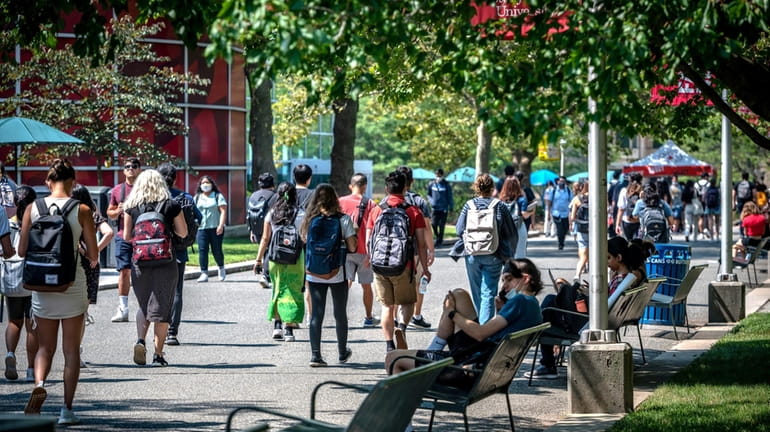New York State budget takes aim at making college more affordable

New York State's 2024-25 fiscal budget includes additional funds for tuition assistance for students at Stony Brook University and other SUNY schools. Credit: Newsday/J. Conrad Williams Jr.
The New York State budget's aim to make college more affordable and accessible includes expanding tuition assistance and requiring all high school students to fill out the application for federal aid, known as FAFSA.
State lawmakers and Gov. Kathy Hochul this past weekend approved a $237 billion spending plan for fiscal 2024-25 that includes requiring students or their parents to fill out the free application, or if applicable, the José Peralta New York State DREAM Act, which helps certain students, whether they are in the United States legally or not, with access to grants and scholarships.
The FAFSA form is used to determine how much federal aid a student is eligible for, but also is used to assess eligibility for state and other aid. Last year, New York college students left more than $225 million of unclaimed federal financial aid on the table by not applying for FAFSA, according to the state Higher Education Services Corporation, which administers state financial aid.
“Higher education can transform New Yorkers’ lives, helping students develop the skills they need to pursue their dreams,” Hochul said Monday in an emailed statement. “We are taking significant steps to ensure all New York students have access to the financial support they need to continue their education and become the next generation of leaders in our state.”
What to Know:
- The final state budget requires all high school students to fill out the free application for federal student aid, known as FAFSA.
- The 2024-25 fiscal plan boosts the state’s Tuition Assistance Program, known as TAP, for New York students attending both public and private colleges and universities.
- The budget also includes increasing income thresholds to $125,000 from $80,000 for TAP eligibility, and boosts the minimum award to $1,000, up from $500.
The budget also boosts financial aid for New York students, whether they attend public or private colleges and universities, through changes to the state’s Tuition Assistance Program, known as TAP. The budget both expands income eligibility and increases the minimum award to $1,000, up from $500.
Farmingdale State College president John S. Nader said the increased household income eligibility threshold, which rose from $80,000 to $125,000 for dependent students and certain independent students, will particularly help students from Long Island.
“It is a high-cost-of-living area and bumping this up by $45,000 is going to be very helpful for our students and may even encourage applications to Farmingdale,” Nader said Monday.
Experts and lawmakers say both initiatives will increase the likelihood of students enrolling in a college or university and help middle- and low-income families afford higher education, as well as lower the amount of loans they would otherwise take out.
FAFSA requirements
The state budget requires all high school students or their families to fill out the form. Those who choose not to must sign a waiver saying so. There is no penalty, however, for not filling out a form, according to the legislation.
School districts, starting in July 2025, must annually report their total number of enrolled high school seniors, and how many students completed the applications or signed waivers.
The cost of college can be a barrier for prospective students, and for many it’s “only because they don’t know about aid that can make it affordable,” State Sen. Andrew Gounardes (D-Brooklyn), who has proposed legislation similar to what is included in the budget, said in a statement Saturday.
“By ensuring every student has the opportunity to complete the FAFSA,” he said, “we show them a door to a prosperous future and put them in position to fling it open.”
Studies show students who complete the FAFSA are more likely to enroll in college after graduation.
SUNY will help with implementation through in-person and virtual training workshops for counselors and families, as well as the SUNY FAFSA Completion Corps, which is composed of current SUNY students who help prospective ones fill out the form, Chancellor John B. King Jr. told Newsday.
Some Republican lawmakers oppose the FAFSA requirement, particularly for students planning to enter the trades.
“This is just another way to make kids who aren’t going to college feel stupid,” Assemb. Mary Beth Walsh (R-Ballston) said during the floor debate Saturday.
Tuition assistance
The increased income threshold for TAP eligibility will mean an additional 26,000 SUNY students eligible for the aid, King said.
It also increases the income threshold from $40,000 to $60,000 for independent married students who have no other tax dependents, and from $10,000 to $30,000 for single, independent students with no dependents. King said about 8,500 SUNY students would benefit from the increase to $30,000. “I am hopeful that will mean more students choosing college,” he said.
The income eligibility hasn’t changed in almost 25 years, Assembly Higher Education Committee Chairwoman Patricia Fahy (D-Albany) told Newsday. “It tells not only low-income families, but middle-income families, ‘We have your back. We want you in school.’ ”
The eligibility expansion could also help colleges and universities struggling financially or seeing a drop in enrollment for various reasons, Fahy said, adding, “It could be a godsend.”
With Michael Gormley
SBU protests continue ... Farmingdale housing development ... Knicks advance .. FeedMe: Croissant Cookies
SBU protests continue ... Farmingdale housing development ... Knicks advance .. FeedMe: Croissant Cookies
